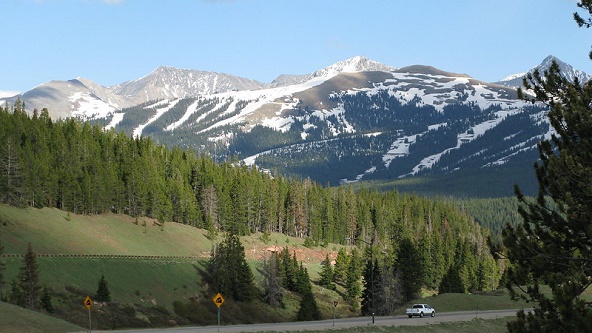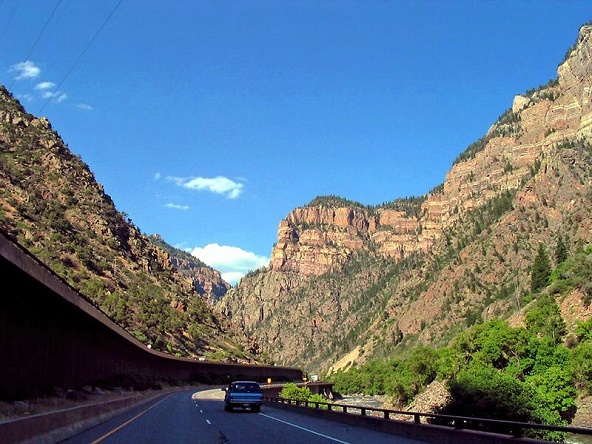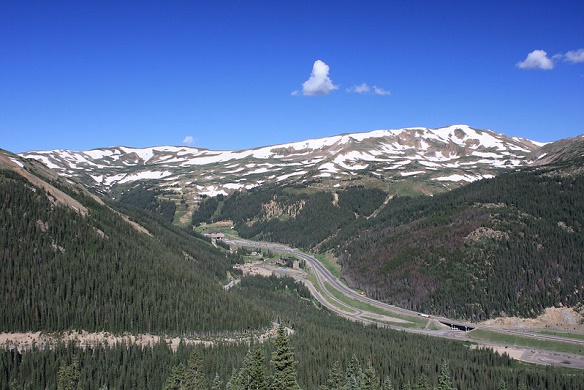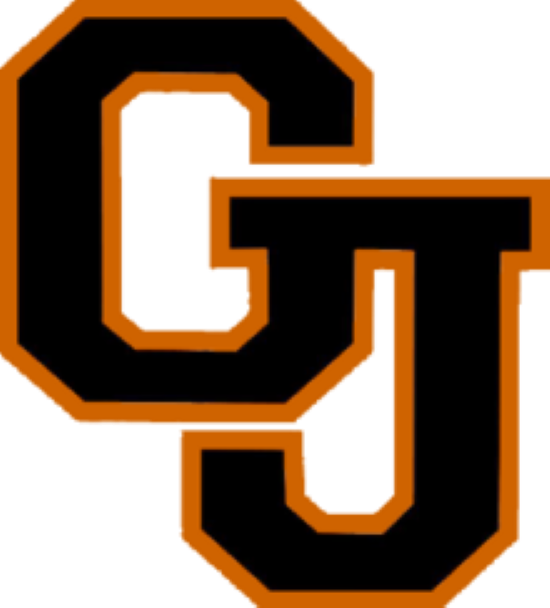The Mile High City is 245 miles from Grand Junction. It takes a little over 4 hours typically, to get from Grand Junction to Denver when driving in normal conditions.
Specifically, we’re talking about 245 miles from downtown Grand Junction to downtown Denver. The western outskirts of Denver, cities like Golden are just 235 miles away, or about a 3 hour and 50 minute drive per Google Maps and per decades of personal experience.

This article covers the drive from Grand Junction to the Denver Metro area. It doesn’t cover bus services like the Bustang (which takes over 6 hours), nor does it cover the faster, but expensive flight options. ($300 tickets for this 50 minute flight are common). A third non-driving option is Amtrak, which runs from the downtown Grand Junction railroad depot to Union Station in downtown Denver. The train ride takes just over 8 hours.
The scenic drive to Denver is entirely made on Interstate 70. Even those of us who have driven it a million times find parts of it to be gorgeous. After all, this route involves everything from dessert landscapes to snow-capped mountains to a 1.6 mile long tunnel. You’ll drive from deep red-rock canyons up 11,000 square foot vistas, then down again.
This drive can be hellish in the winter, but assuming you have good weather, it’s an enjoyable drive with lots of scenery to make the trip faster.
Grand Junction to Denver Map
(Below here, “A” is Grand Junction and the route to Denver, “B”)
Driving from Grand Junction to Denver
The first leg of the trip is the least interesting, (except for the curvy De Beque Canyon), but the drive from Grand Junction to Glenwood Springs is flat, easy and fairly quick, at a little over an hour driving time.
From there the views get much prettier. Highlights of the drive include gorgeous Glenwood Canyon, views of the Gore Range when going up Vail Pass, the 1.6 mile-long Eisenhower-Johnson Tunnel (previously the highest vehicle tunnel in the world), and arriving at the top of Genesse Park near Denver, where it seems you can see all the way to Kansas.
Towns along the way include everything from uber-luxurious Vail, to outlet mall havens like Dillion, to charming and scenic old West towns, like Georgetown and Idaho Springs.
At one point along the drive, you’ll find yourself at 10,662 feet above sea level (the top of Vail Pass).
But that’s not even the highest you’ll go.

In fact, you’ll go from the nearly 11,000 foot elevation of Vail Pass down to “only” around 9,000 feet in Frisco, before going back up to the trip’s highest point:11,158 feet above sea level at the Eisenhower-Johnson tunnel. This ear-popping journey has you descending roughly 2,000 feet then ascending 2,000 feet – all within about 1/2 hour. I-80 through Iowa this is not.
I-70 Weather Worries When Driving from Grand Junction to Denver
I cannot overstate how important it is to be aware of road conditions before travelling from Grand Junction to Denver.
From October to May, it’s imperative to know the forecast for Vail and Dillon. Weather forecasts for these two towns are the most important (in my view), as they’ll give you an idea as to whether or not you should post-pone your trip.
A snowstorm at 11,000 feet is nothing to sneeze at. Pre-internet days I drove to Denver during a snowstorm, only to see this 4 hour jaunt turn into a stress-filled marathon. Another time I made the drive on April 26th, thinking snow season was over, only to be caught in a near white-out. Now I’ll only make the drive with clear roads, or with a forecast that projects only light flurries. Anything stronger, and I’ll save the drive to Denver for the next day.
You can look at live web cams and get up-to-date road conditions from the Colorado Department of Transportation’s website here: CDOT
One last weather note: Glenwood Canyon has experienced mudslides that have caused the canyon to be closed – sometimes for days on end. If the Glenwood Springs area is experiencing heavy rain, you may want to check the status of Glenwood Canyon – regardless of time of year.
I-70 Traffic to Denver from the Mountains
Other than the chance of a snowstorm, or rockslides, the only major issue in driving from Grand Junction/Fruita/Palisade to Denver are Saturday afternoons during ski season, and Sunday afternoons all year long.
(Related: Grand Junction to Vail)
If at all possible, avoid an afternoon Grand Junction-to-Denver drive on these days. The ski areas closest to Denver, (i.e. Winter Park, Arapahoe Basin, Breckenridge, Keystone, Loveland, Copper Mountain, and Vail) get tons of Denver area visitors on weekends. And even though ski areas typically close at 4 PM, eastbound I-70 back to Denver gets clogged at 2 PM (in my experience).

A fairly new express lane (for a fee of course), has helped somewhat, but this section of I-70 from Eisenhower Tunnel to Denver can be basically a parking lot on weekends.
(Related: Grand Junction to Colorado Springs)
In the off season, you’ll have better luck with a Saturday afternoon drive, but still try to avoid being here on a Sunday afternoon. Campers/hikers/fishermen and others from the Front Range returning from their weekend in the mountains make this a mile-high traffic jam.
(By Steve Beauregard. Photos courtesy of Don Graham, Rob Pongsajapan, and David Herrera via Flickr).
